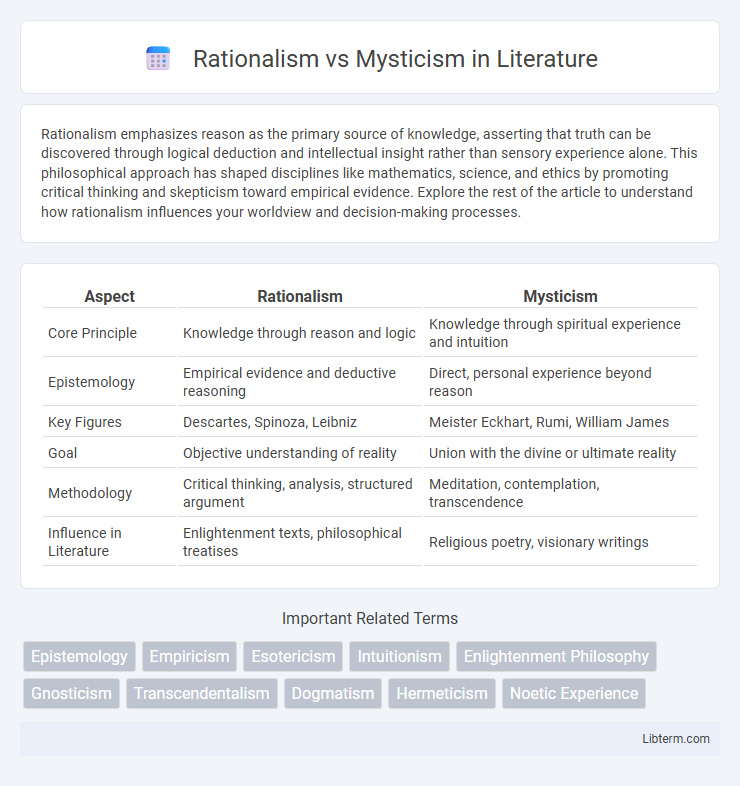Rationalism emphasizes reason as the primary source of knowledge, asserting that truth can be discovered through logical deduction and intellectual insight rather than sensory experience alone. This philosophical approach has shaped disciplines like mathematics, science, and ethics by promoting critical thinking and skepticism toward empirical evidence. Explore the rest of the article to understand how rationalism influences your worldview and decision-making processes.
Table of Comparison
| Aspect | Rationalism | Mysticism |
|---|---|---|
| Core Principle | Knowledge through reason and logic | Knowledge through spiritual experience and intuition |
| Epistemology | Empirical evidence and deductive reasoning | Direct, personal experience beyond reason |
| Key Figures | Descartes, Spinoza, Leibniz | Meister Eckhart, Rumi, William James |
| Goal | Objective understanding of reality | Union with the divine or ultimate reality |
| Methodology | Critical thinking, analysis, structured argument | Meditation, contemplation, transcendence |
| Influence in Literature | Enlightenment texts, philosophical treatises | Religious poetry, visionary writings |
Understanding Rationalism: Foundations and Principles
Rationalism is a philosophical doctrine asserting that reason and intellect are the primary sources of knowledge, emphasizing innate ideas and deductive reasoning as opposed to sensory experience. Key figures such as Rene Descartes, Baruch Spinoza, and Gottfried Wilhelm Leibniz established the foundational principles of rationalism, promoting the belief that certain truths are accessible through logical analysis and mathematical principles. This approach prioritizes clarity, coherence, and systematic doubt, forming the basis for scientific inquiry and objective understanding.
Defining Mysticism: Key Concepts and Practices
Mysticism centers on the direct, personal experience of the divine or ultimate reality, often through practices such as meditation, contemplation, and rituals aimed at transcending ordinary perception. Key concepts include unity with the cosmos, inner illumination, and the dissolution of ego, emphasizing experiential knowledge over rational analysis. Mystical traditions like Sufism, Kabbalah, and Christian mysticism illustrate diverse paths toward spiritual awakening and insight beyond intellectual understanding.
Historical Origins: Rationalism and Mysticism in Context
Rationalism emerged in the 17th century during the Age of Enlightenment, emphasizing reason, logic, and empirical evidence as the foundation of knowledge, with key figures like Descartes and Spinoza shaping its philosophical framework. Mysticism, rooted in ancient spiritual traditions including Hinduism, Sufism, and Christian mysticism, focuses on direct, intuitive experience of the divine or ultimate reality beyond rational comprehension. The historical context highlights Rationalism's challenge to medieval scholasticism, while Mysticism preserved spiritual insight through personal, transcendental experiences during periods of religious orthodoxy and intellectual rigidity.
Core Differences Between Rational Thought and Mystical Insight
Rationalism emphasizes logic, empirical evidence, and structured reasoning to understand reality, relying on objective analysis and reproducible results. Mysticism prioritizes subjective experience, intuition, and direct spiritual insight as pathways to knowledge, often transcending conventional logic and sensory perception. The core difference lies in rationalism's dependence on external validation versus mysticism's focus on inner transcendental awareness.
Rationalism in Philosophy and Science
Rationalism in philosophy emphasizes knowledge derived from reason and logical deduction, asserting that innate ideas and intellectual intuition form the foundation of understanding. In science, rationalism underpins the development of theories through systematic observation, hypothesis formulation, and rigorous experimentation, prioritizing evidence-based conclusions over subjective experience. This approach fosters advancements in mathematics, physics, and epistemology by valuing clarity, consistency, and empirical validation.
Mysticism in Religion and Spirituality
Mysticism in religion and spirituality emphasizes direct, personal experiences of the divine or ultimate reality, often transcending rational explanation through practices like meditation, contemplation, and prayer. This approach values intuitive knowledge and inner transformation over empirical evidence or logical reasoning, highlighting the ineffable nature of spiritual truths. Mystical traditions across various faiths, including Sufism in Islam, Kabbalah in Judaism, and Christian mysticism, underscore the pursuit of unity with the sacred or absolute.
Prominent Thinkers: Rationalists vs. Mystics
Rene Descartes and Baruch Spinoza stand as prominent rationalists who emphasized reason and deductive logic as the primary means to acquire knowledge. In contrast, mystics like Meister Eckhart and Jakob Bohme emphasized direct, intuitive experiences and spiritual insight beyond empirical reasoning. The intellectual divide between rationalists and mystics highlights the tension between systematic knowledge acquisition and transcendent, experiential understanding in philosophy.
Rationalism and Mysticism in Modern Society
Rationalism in modern society drives scientific progress, emphasizing logic, evidence-based reasoning, and critical thinking to solve complex problems and advance technology. Mysticism continues to influence contemporary culture by offering spiritual insights, personal transformation, and a sense of connectedness beyond empirical knowledge. Both frameworks coexist, shaping diverse worldviews and informing practices in psychology, healthcare, and environmental ethics.
Bridging Rationalism and Mysticism: Is Integration Possible?
Bridging rationalism and mysticism involves integrating logical analysis with experiential insight, highlighting how empirical evidence and intuitive knowledge can coexist. Philosophers such as Spinoza and contemporary thinkers explore frameworks where rational inquiry and mystical experience complement rather than contradict each other. This integration fosters a holistic understanding of reality, combining reason's clarity with mysticism's depth.
Rationalism vs. Mysticism: Implications for Knowledge and Truth
Rationalism emphasizes reason, logic, and empirical evidence as the primary means to acquire knowledge and discern truth, prioritizing structured thinking and systematic validation. Mysticism, in contrast, relies on direct, experiential insight and spiritual intuition, suggesting that deeper truths often transcend rational explanation and lie within subjective experience. The implications for knowledge and truth reveal a fundamental tension between objective analysis and personal revelation, influencing diverse fields such as philosophy, science, and spirituality.
Rationalism Infographic

 libterm.com
libterm.com